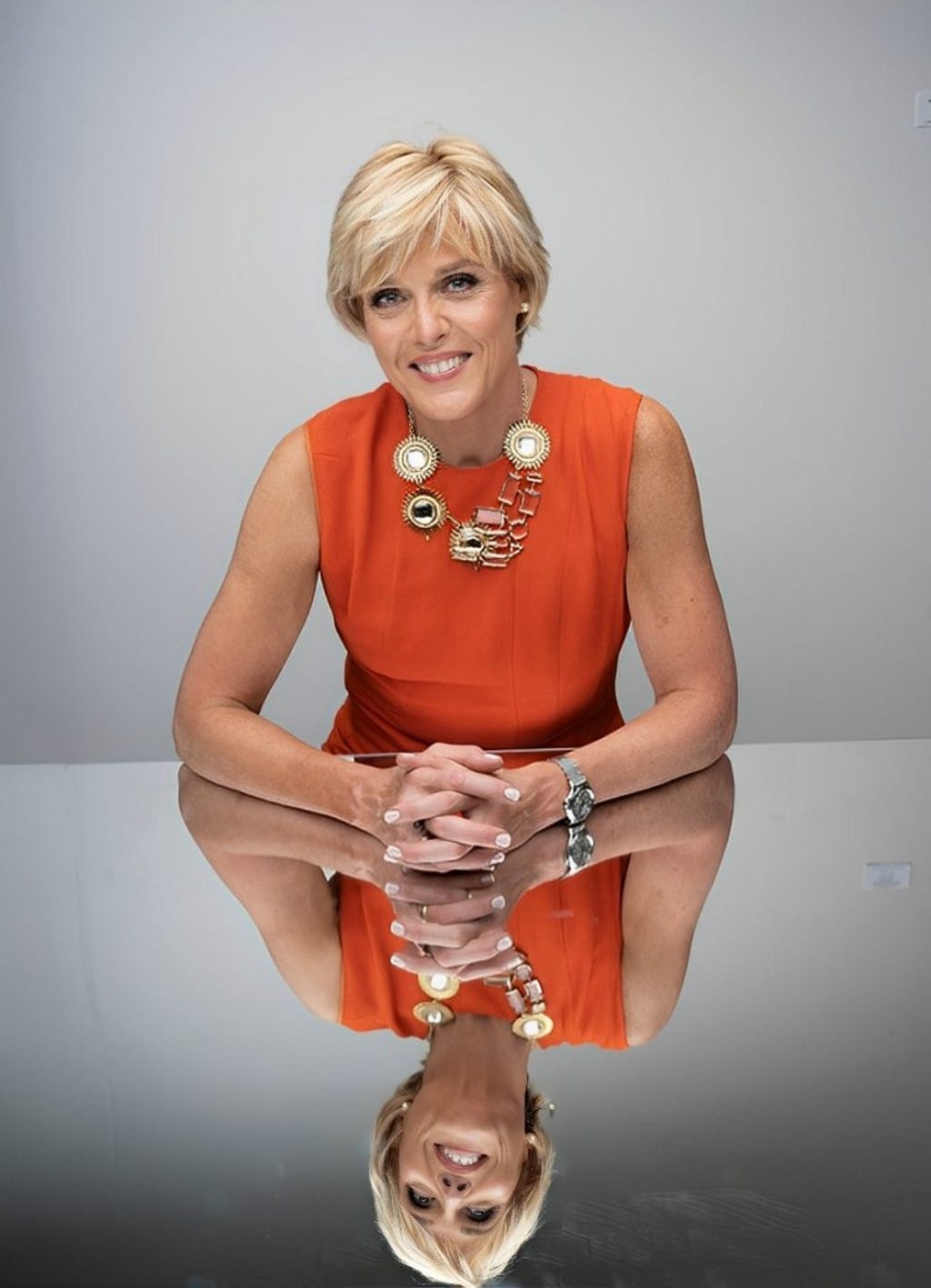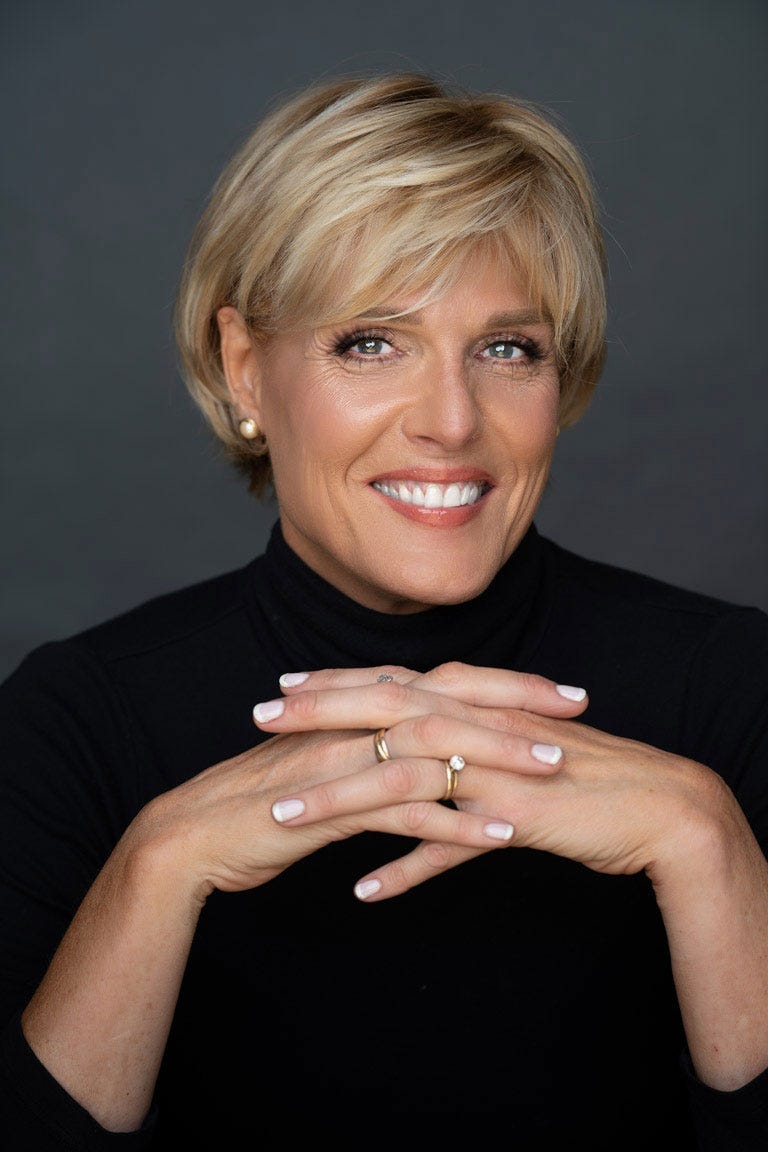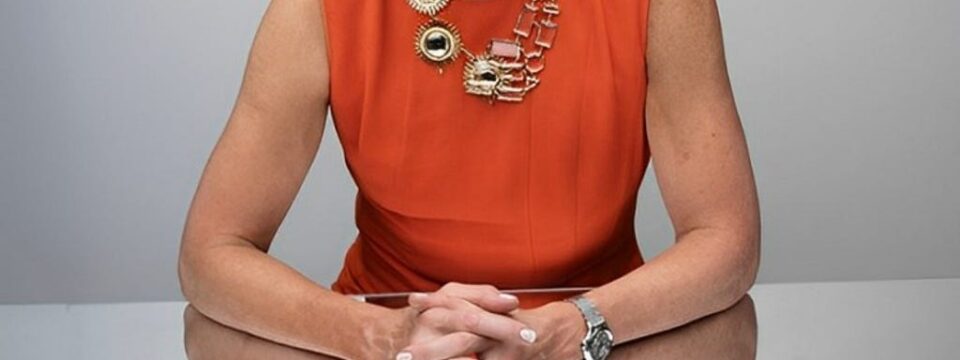
Don’t be intellectually seduced by someone’s degree. I was asked to write a book and then get a co-author because the deadlines would be too hard for one person to achieve, so I asked a tenured PhD professor who had attached himself to my work if he wanted to be a co-author. I got him an agent and a book contract that he’d never been able to get himself. He then refused to write a single word and left me to not only document what he refused to do but to write the entire book alone. I was covered in hives at one point, but I achieved the impossible and realized how much I was capable of by myself.
As part of my series about “authors who are making an important social impact”, I had the pleasure of interviewing Caroline Adams Miller.
For over three decades, Caroline has been a pioneer with her groundbreaking work in the areas of the science of goal setting, grit, happiness, and success. She is recognized as one of the world’s leading positive psychology experts on this research and how it can be applied to one’s life and work for maximum transformation. She is the author of nine books, including My Name is Caroline, Getting Grit, Positively Caroline and Creating Your Best Life, which the “father of Positive Psychology,” Dr. Martin Seligman, lauded in Flourish as “adding a major missing piece” to the world of goal setting. She is a magna cum laude graduate of Harvard University and attained one of the first 32 degrees in the world in Applied Positive Psychology from the University of Pennsylvania.
Thank you so much for joining us in this interview series! Before we dive into the main focus of our interview, our readers would love to “get to know you” a bit better. Can you tell us a bit about your childhood backstory?
Although Washington, DC is considered a transient town, I’m the fifth generation to live here, and my great great grandfather was one of Abraham Lincoln’s trusted friends who served in his Honor Guard when he wasn’t running his jewelry and watchmaking store just steps from the Nation’s Capital. On my other side, my great uncles made Olympic history in 1912 when they became the first siblings to go 1–2 in the same event (Platt and Ben Adams in the standing high jump). So both of these strands inform who I am: I love to learn how to help my CEO clients “tick” at their best while my background as a competitive swimmer and current status as an active Masters swimmer gives me the competitive mindset that has led me to write a number of books that all share a thread of having grit and doing hard things.
When you were younger, was there a book that you read that inspired you to take action or changed your life? Can you share a story about that?
The Clue in the Crossword Cipher was one of the first Nancy Drew books I read, and I eventually owned every one of them and even met the author, who happened to be the grandmother of a fellow student at my DC preparatory school. I loved the fact that she was daring and adventurous and bold. She and other women from other books I read became role models for doing hard things and not taking “no” for an answer.
It has been said that our mistakes can be our greatest teachers. Can you share a story about the funniest mistake you made when you were first starting? Can you tell us what lesson you learned from that?
I was in the first class of the University of Pennsylvania’s Masters of Applied Positive Psychology program in 2005. When I saw a small, middle-aged bearded man leaning against a wall in our first immersion class. I turned to the people at my table and excitedly informed them that the singer Cat Stevens was in our class, which meant that he must be singing again. Everyone turned to look at him and looked back at me with amusement. “That is the famous Russian comedian Yakov Smirnoff who has been in “Moscow on the Hudson” and lots of other shows and movies. Can’t you see that?” I nodded that I clearly knew the difference between the men and then I excused myself to go to the ladies’ room, where I frantically typed out a message on my Blackberry to my husband. “What is Yakov Smirnoff?” I wrote. I got back a lot of information and then became great friends with Yakov, who had one of the funniest laughs I’ve ever heard. I told him that I’d thought he was Cat Stevens at first, and he paused and responded, “And who is Cat Stevens?” It was a hilarious kickoff to one of the most life-changing years of my life.
Can you describe how you aim to make a significant social impact with your book?
I believe that our world is in a Renaissance period of finding new ways to perform medical treatments, educate ourselves, expand our earth horizons into space, and use new forms of currency, among many other shifts. This is identical to the period after the Bubonic Plague in the Middle Ages, which saw a shift to evidence-based medicine and other scientific approaches, which gave birth to the Renaissance. For too long, goal setting has been mired in “zombie” systems that are unscientific, like SMART goals and The Law of Attraction, and they won’t die because we haven’t brought the real science to the world yet. I want people to have access to the best science on how to set, pursue, and achieve their goals using the best research and science available so that people and organizations can identify big goals and have proven resources to help them. This means that everyone should start their journey by learning Locke and Latham’s Goal Setting Theory, which is the #1 ranked theory of 73 management theories by its peers, and it has never had a replication crisis. Somehow these two men’s rigorous decades of scholarship have been overlooked in favor of pop psych, so I’m bringing it to the mass market and updating it with my BRIDGE methodology, which is a set of prompts in six areas — Brainstorming, Relationships, Investments, Decision-Making, Good Grit, and Excellence — to ensure that one’s strategy is thorough.
Can you share with us the most interesting story that you shared in your book?
Mary Parker Follett is a brilliant woman from the early 1900s who is mostly lost to history even though her writings and speeches to small groups were influential at the time. She was the first person to come up with the idea of “win-win” and using conflict to create new solutions. She is also credited with the idea of community centers as havens for youth who needed a place to go after school. Her multiple interests from philosophy to politics to social change gave her a unique and disruptive approach to many of the problems of her time. She issued a call to make workplaces more democratic and less robotic and to identify good leaders as “transformational leaders” who were “given” power and did not “take” power. In the late 20th century, her work was rediscovered and published, and it’s now thought that she was 100 years ahead of her time in terms of prioritizing worker wellbeing and describing people’s impact upon each other as the best way to create and solve goals.
What was the “aha moment” or series of events that made you decide to bring your message to the greater world? Can you share a story about that?
While everyone was sequestered during the COVID-19 pandemic, I was also recovering from cytomegalovirus, which forced me to rest for months and to prioritize my health. I began to listen to hours and hours of podcasts on health, wellbeing, and success during restorative walks on the beach. One day, I realized that I’d heard nothing but men talking to men about men who were changing the world and being heroic. I began to call them “dudepodcasts.” It sparked curiosity in how the lack of comparable female stories and voices might be impacting agentic behavior among women, which is the only area that has seen no change in public perception since the 1940s. Ambitious, goal-oriented women pay a huge social price for violating stereotypes of being communal and nurturing, and that led me to look harder at whether or not the world was tilted towards creating an environment and expectations that would lead women to have fewer expectations for their own successes. When I began to pile up lots of other research that proved to me that goal setting methods had not been radically updated for decades, including in the areas of gender, wellbeing, grit, and mindset, and that there was no one book that brought it all together, I decided to write it myself.
Without sharing specific names, can you tell us a story about a particular individual who was impacted or helped by your cause?
I worked with a quadriplegic client who had lost hope that she could make a difference in the world before she hired me. Our work uncovered her top character strengths, and we mapped out a five-year plan for her to move from being a lawyer to speaking about finding joy in her chair. She immediately felt that she was purposeful and able to withstand the harder and more demotivating parts of her life by knowing that her strategy was well-formed. She had more zest and optimism and today she is living the life we mapped out together more than ten years ago! Her grit is inspirational.
Are there three things the community/society/politicians can do to help you address the root of the problem you are trying to solve?
We need to teach Goal Setting Theory by Locke and Latham in every elementary school so that any child who has a goal has the tools to create a strategy to succeed. We too often talk about “dreams” and “BHAGs” and don’t provide people with the science that will help them make their dreams come true. In a world that has young adults with high levels of anxiety and depression, we must start talking early about putting in the time and effort to create strategies that will succeed.
I’d like to create more conversations about the importance of doing hard things and having “good grit” — the kind of behavior that requires being persistent, passionate, humble, patient, and resilient. In a quick fix society with dumbed-down playgrounds and grade inflation, some of these lessons have been watered down into “everyone is a winner,” which doesn’t create real winners.
The more we hear our role models talking about the failures they have experienced and overcome, and less about curated versions of success, we will begin to learn that passion and persistence are the keys to getting more of what we want.
How do you define “Leadership”? Can you explain what you mean or give an example?
Leadership is the ability to behave in such a way that others are awed and inspired to take action themselves without whining, complaining, or expecting someone else to do the work for them. Katherine Johnson, the mathematician who refused to let racial barriers and discrimination stop her from pursuing her passion, was the person whom John Glenn required to check the numbers before he went into space. She did the work, took a stand on getting credit for her papers, and earned the respect of men and women all around the world for the dignified way she refused to let the worst of society dictate who she wanted to be.

What are your “5 things I wish someone told me when I first started” and why? Please share a story or example for each.
Don’t be intellectually seduced by someone’s degree.
I was asked to write a book and then get a co-author because the deadlines would be too hard for one person to achieve, so I asked a tenured PhD professor who had attached himself to my work if he wanted to be a co-author. I got him an agent and a book contract that he’d never been able to get himself. He then refused to write a single word and left me to not only document what he refused to do but to write the entire book alone. I was covered in hives at one point, but I achieved the impossible and realized how much I was capable of by myself.
Invest in a support system long before you can afford it.
I am an energetic entrepreneur who did all my billing, marketing, social media, and appointments for almost twenty years before I invested in a team of people to help me become more successful, which is a mistake too many women make. Life has been so much better since I did that!
Find an area where you can really develop your passions as part of your work so that you are not like everyone else.
As the field of coaching was exploding, I realized that there would be tons of “leadership” and “executive” and “life” coaches with similar training, and that I needed to separate myself from the pack by being deep and excellent in an area that wasn’t common. My expertise as an evidence-based coach on goal setting and grit has differentiated me from every other coach I’ve met.
Narrow your circle down to people who have your back.
We now know that women make the mistake of tolerating passive-aggressive behavior and “frenemies” in their lives to avoid being seen as “not nice,” but research shows that you do this at your peril. I’ve lost too much time and energy explaining away bad behavior from people whom I assumed would want me to set big goals and do hard things, but when I stopped doing that and decided to simply be around people who were “active-constructive” responders who had curiosity and enthusiasm about my ideas and goals, my mood and successes improved drastically.
Prioritize happiness.
Like most people, I always thought that happiness followed success, but research has shown otherwise. People who begin their days by upping their wellbeing with gratitude, exercise, journaling, altruism, and other “positive interventions” build up a durable set of behaviors that serve them well and a mindset that attracts others.
Can you please give us your favorite “Life Lesson Quote”? Can you share how that was relevant to you in your life?
“You can’t keep what you don’t give away.” I was really happy that I found a way and a group of people to help me overcome bulimia in my early 20s in the 1980s when bulimia had no cure and eating disorders could be death sentences. A wise person said to me, “You can’t keep what you don’t give away,” so I made sure that for every day of recovery that I enjoyed, I helped someone else to recover, too. That led me to write My Name is Caroline, the world’s first autobiography on bulimia recovery in 1988, which has resulted in over 100,000 letters and calls from people all over the world who say I was the first person to give them hope that they didn’t have to live in a prison of food.
Is there a person in the world, or in the US with whom you would like to have a private breakfast or lunch with, and why? He or she might just see this, especially if we tag them. 🙂
Serena Williams, who isn’t just a legendary athlete for the ages. She has overcome discrimination from an early age and has remained thoughtful, disciplined, kind, and principled as she has entered her next chapter as a philanthropist, mother, and mentor.
How can our readers further follow your work online?
My websites are www.carolinemiller.com and www.biggoalsbook.com. My social media is @carolineadamsmiller on Instagram, Facebook, and LinkedIn
This was very meaningful, thank you so much. We wish you only continued success on your great work!
Social Impact Authors: How & Why Author Caroline Adams Miller Is Helping To Change Our World was originally published in Authority Magazine on Medium, where people are continuing the conversation by highlighting and responding to this story.
